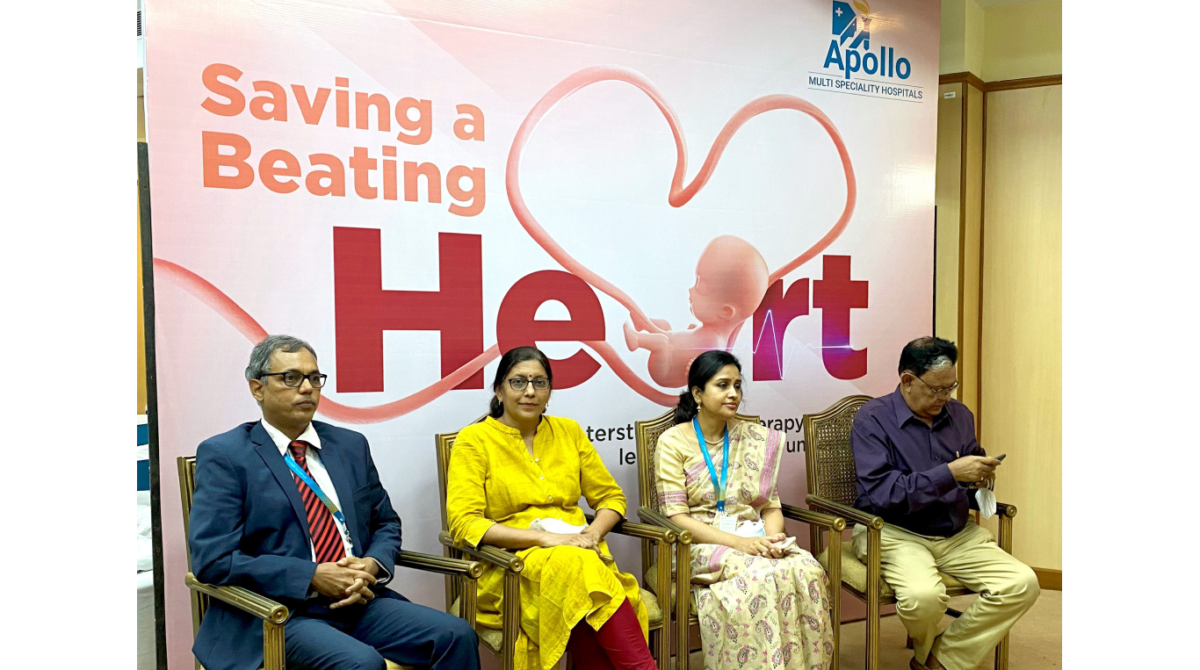KOLKATA, October 07, 2021: For the first time in Eastern India, doctors at Apollo Multispecialty Hospital gave a new lease of life to an unborn by interstitial laser therapy using Diode laser. In Interstitial Diode Laser Therapy a fine needle is inserted into the mother’s womb to release some laser beams into the sick twin which gets terminated in the process to save its healthier co-twin. The procedure is conducted with the continuous support of ultrasound.
Due to more people opting to become parents at a later age and hence the increase of IVF there has been a significant increase of twin babies around the world. Currently, one in fifty pregnancies have twin babies and twin pregnancies are always high-risk pregnancies. Among all twin pregnancies, about 66% are dichorionic (babies form from 2 separate eggs and sperms and have separate compartments with separate blood flow inside the uterus) and 33% are monochorionic (babies form from 1 egg and 1 sperm and have a common compartment with single blood flow inside the uterus).
In the case of monochorionic twin pregnancy, there is a high chance of cross (selective) intrauterine growth restriction called Twin-to-twin-transfusion syndrome (TTTS), which is the most important cause of prenatal death of twins. The syndrome typically occurs in the second trimester in about 10-15% of monochorionic twin pregnancies and one of the babies don’t grow as expected and compared to the other. This happens as sharing the same placenta causes blood flow imbalance amongst the twins, where one foetus becomes the so-called donor twin and the other the recipient.
If untreated, perinatal mortality is unavoidable as one baby dies due to lack of nutrition and the other due to overnutrition. Secondly, if there is any clot or cardiac dysfunction in the weaker baby due to lack of nourishment, the clot or cardiac issue gets transferred to the healthy baby as well through the common placenta causing the death of the healthy baby within 72 hours of the weaker baby’s death inside the foetus. In this case, the mother was detected with the issue at 14 weeks of pregnancy, when saving both the babies by ensuring proper growth inside the womb was impossible.
Interstitial Laser Therapy is the only procedure that can save at least one baby out of the two. In a single treatment procedure, with help of ultrasound in order to see the foetus and placenta, the technique separates the connection of the vessels between the two babies. As a result of this, the weaker donor baby stops receiving nutrition while the healthy baby keeps growing inside the foetus.
Dr Jayanta Kr Gupta, Director & HOD Obstetrics & Gynaecology, Apollo Multispecialty Hospitals, Kolkata said, “It’s indeed a tough decision for parents to let go of one of the twins before birth, but this is the only way to save the other baby or else both the babies can’t live. We here at Apollo for the very first time in Eastern India did the procedure of Interstitial Laser Therapy so that we can at least save one of the twins. The treatment was applied in a case of Twin-to-twin-transfusion syndrome (TTTS), which is unique to identical twins, who by nature get nutrition supplied by a single placenta. And we hope to perform on more pregnant women with Twin-to-twin-transfusion syndrome so that they don’t lose their babies due to this condition of intrauterine growth restriction. For this, early detection through regular check-ups including USG is critical during pregnancy.”
About Apollo Hospitals Enterprise Ltd. (AHEL)
It was in 1983, that Dr. Prathap C. Reddy made a pioneering endeavour by launching India’s first corporate hospital – Apollo Hospitals in Chennai.
Now, as Asia’s foremost trusted integrated healthcare group, its presence includes over 12,000 beds across 71 Hospitals, 3,300 Pharmacies, over 90 Primary Care Clinics and 150 diagnostic centres, 110 plus Telemedicine Centres, over 15 medical education centres and a Research Foundation with a focus on global Clinical Trials, epidemiological studies, stem cell & genetic research, Apollo Hospitals has been at the forefront of new medical advancements with the most recent investment being the commissioning of South East Asia’s very first Proton Therapy Centre in Chennai.
Every four days, the Apollo Hospitals Group touches a million lives, in its mission to bring healthcare of international standards within the reach of every individual. In a rare honour, the Government of India had issued a commemorative stamp in recognition of Apollo’s contribution, the first for a healthcare organization. Apollo Hospitals Chairman, Dr. Prathap C. Reddy, was conferred with the prestigious Padma Vibhushan in 2010.
For 35 years, the Apollo Hospitals Group has continuously excelled and maintained leadership in medical innovation, world-class clinical services and cutting-edge technology. Its hospitals are consistently ranked amongst the best hospitals in the country for advanced medical services.
For more information:
Amitava Chakraborty | amitava_c@apollohospitals.com | 9804000201
Sumantika Choudhury | sumantika.choudhury@adfactorspr.com| 9830056185



